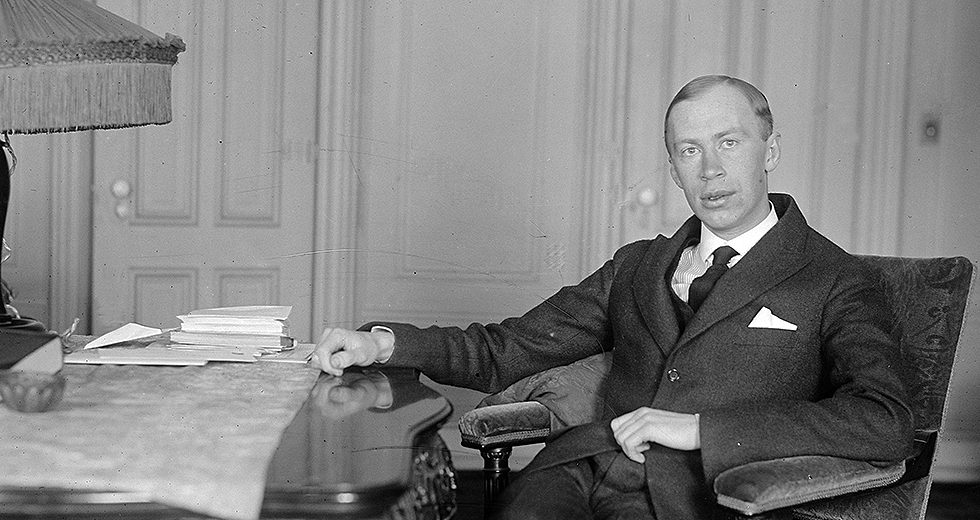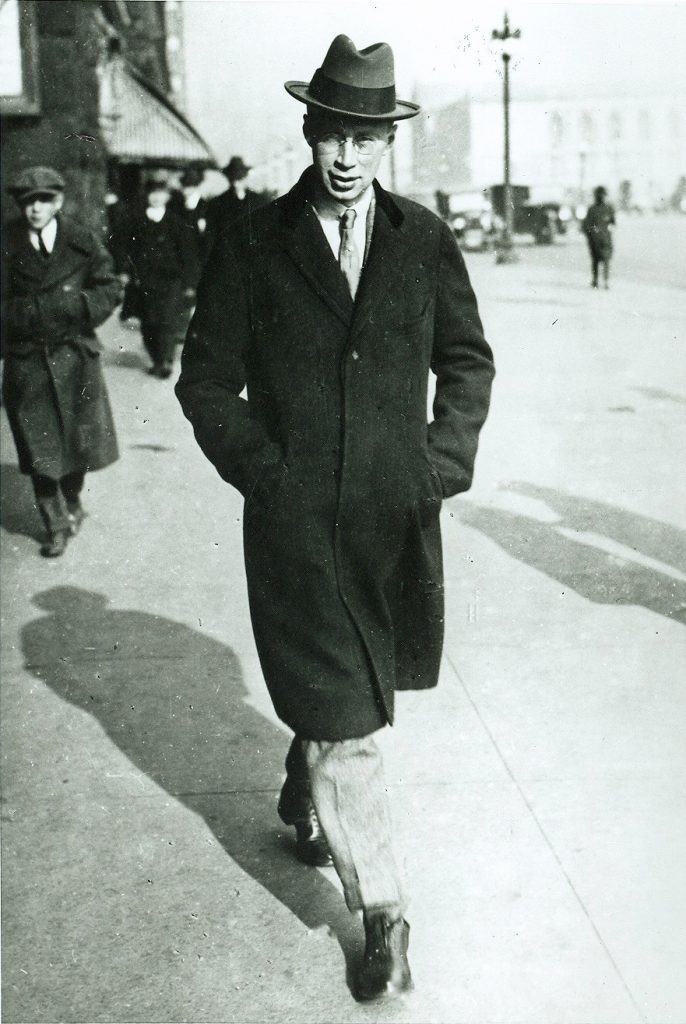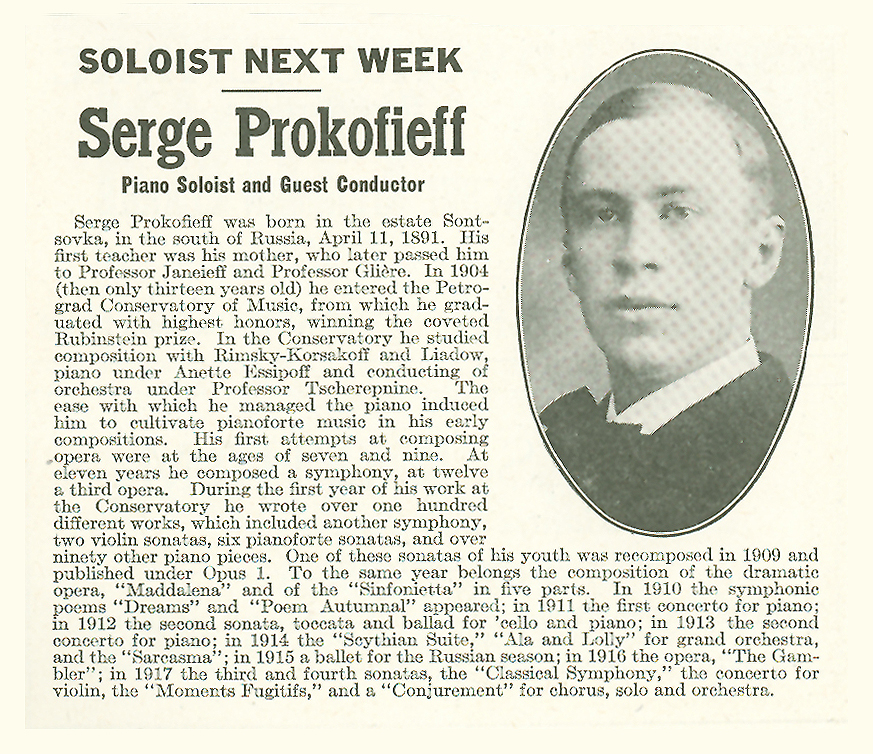
In the summer of 1917, Chicago businessman Cyrus McCormick Jr., son of the farm machine magnate, met a 26-year-old pianist and composer while he was on a State Department trip to Russia. McCormick had never heard of Sergei Prokofiev when he was introduced to him, but the composer recognized at once the distinguished American’s name, because his father had managed an estate that owned several McCormick reapers. McCormick had become a governing member of the Chicago Symphony Orchestra in 1905, and he was unusually curious about music. “He wanted my recommendations of Russian musical compositions generally,” Prokofiev recalled, “and mine in particular, to send to America.” Prokofiev gave him every published piece he had composed, along with a hand-written copy of the Scythian Suite.
But he was furious when he learned that McCormick was also shipping home a trunk full of compositions by Kalinnikov, Glière and others that he planned to show Frederick Stock, the orchestra’s music director. “You are taking away with you all the bad music in Russia,” he told him. “McCormick looked at me and gave a laugh that could be heard all over the Winter Palace.”

In Chicago for a recital in fall 1919, Sergei Prokofiev strides down Michigan Avenue.
Before McCormick left for Chicago, Prokofiev stressed how much he wanted to give concerts in America. McCormick told him to stay in touch; he had many contacts in musical circles in the United States. He then wrote to Stock, saying that he thought Prokofiev “would be glad to come to Chicago and bring some of his symphonies if his expenses were paid. But not knowing myself the value of his music, I did not feel justified in taking the risk of bringing him here.”
A few weeks later, Stock paged through Prokofiev’s scores and shot off a response: “There is no question in my mind as to the talent of young Serge.”
The CSO presents Prokofiev’s Ivan the Terrible, conducted by Riccardo Muti, on Feb. 23-25.
McCormick could not have guessed at the time that he had unwittingly introduced Stock to one of the defining figures of 20th-century music — or that Chicago would soon prove to be the steppingstone to Prokofiev’s sweeping American popularity. That December, Prokofiev made a note in his diary: “To go to America! Of course! Here was wretchedness; there life brimming over. Here, slaughter and barbaric rhetoric; there, cultivated life. Here, shabby concerts in Kislovodsk; there, New York, Chicago!”
The following spring, he was granted a travel visa, with the help of a letter from McCormick. In August 1918, Prokofiev arrived in Chicago, “for so long a city of mythical status” for him. “I anticipated being bowled over by Chicago’s overwhelming energy and mobility, and I did feel something of this,” he wrote in his diary, “but the city itself seemed somehow cramped and unattractive, with large tracts of soot-stained houses.” He walked the downtown streets and admired the glittering shop window displays, and he took a three-hour bus tour of the city. But he had no money to spend, and he tired of looking at Chicago parks.
When he tried to see McCormick, his secretary said he was on his way to New York City. Chicago was not what Prokofiev had expected. But then things changed. “Today brought my first significant victory,” Prokofiev wrote in his diary in late September. He had played his music for Stock. “Stock went into ecstasies,” he wrote, and offered him an invitation to perform and conduct in Chicago that December. They agreed on a program: Prokofiev would play his First Piano Concerto, under Stock’s baton, and conduct the Scythian Suite — the work he had handed over to McCormick. Both would be U.S. premieres.
When he returned to Chicago on Dec. 1, Prokofiev felt like a different man. He stayed at the Congress Hotel, because this time, he wrote, he had come as a barin — a gentleman of standing. The windows of his room looked out over Lake Michigan, and he enjoyed strolling up Michigan Avenue, with its luxurious shops, because he now had money in his pocket. (He still found Chicago “cramped and sooty,” and the hotel lobby was so lugubrious that he thought it would make the perfect setting for an assignation or a murder. “What on earth can have prompted the Americans to come up with a hall like this!”)
In the weeks since Prokofiev had first arrived in Chicago, Stock had bowed to wartime sensitivities and temporarily resigned as music director of the Chicago Symphony until he settled the issue of his U.S. citizenship, which had never been finalized when he moved to Chicago in 1895. In the meantime, the CSO was under the leadership of his assistant, Eric DeLamarter. Prokofiev’s rehearsals for the Scythian Suite went well — “The orchestra was splendid,” he wrote after the final run-through — but he was disappointed in DeLamarter, who didn’t seem to know the score of Prokofiev’s concerto. “So I took charge of the rehearsal myself, leaving DeLamarter off to one side.”
He was reunited with McCormick, who took him to a Chamber of Commerce lecture on the current problems in Russia, to which Prokofiev listened with strange detachment from his comfortable armchair. He met with Cleofonte Campanini, the head of the Chicago Opera, and they began to make plans for the world premiere of an opera in Chicago — perhaps The Gambler, from which Prokofiev played selections at the piano, or The Love for Three Oranges, which he had not yet even begun.

Ahead of his 1921 appearance with the CSO, Prokofiev receives a welcome in the program book (which uses the standard spelling of his name during that time).
On Dec. 6, the day of his Chicago Symphony Orchestra debut, Prokofiev wrote: “For some reason I was greeted by an ovation from the absolutely full hall when I stepped on the platform.” After the concerto, he took seven curtain calls. “I am compiling statistics of these during my American sojourn; it is very much in the American spirit,” he said.
“The appearance here of the young Russian, Serge Prokofieff at the Chicago Symphony Orchestra concert was the most startling, and in a sense, important musical event that has happened in this town for a long time,” wrote Henriette Weber in the Chicago Herald-Examiner (using the then-standard spelling of the composer’s name). “His business is his music, while he is on the stage, and he would seem to resent even the time that it takes to bow,” reported the Chicago Journal. His compositions caused a stir. “The music was of such savagery, so brutally barbaric,” Weber wrote, “that it seemed almost grotesque to see civilized men, in modern dress with modern instruments performing it. By the same token it was big, sincere, true.”
The Chicago public loved it. “Every man and woman there reacted to it,” Weber continued, “and Prokofieff was given a thundering ovation that at least in a slight degree expressed the tumultuous emotions he inspired.” The next day, Prokofiev went to see Campanini in his office. They bickered over fees, but finally agreed to present the world premiere of The Love for Three Oranges in Chicago. Prokofiev started writing the libretto on the train to New York the next day.
Prokofiev returned to Chicago several more times over the years. In 1919, he gave two piano recitals (“The reviews were good,” he wrote. “I have made much more of an impression here than in New York.”) In 1921, he oversaw the world premieres of his Piano Concerto No. 3, which he played under Stock’s baton with the Chicago Symphony on Dec. 16 —“One could not wish for a better orchestra,” he wrote — and The Love for Three Oranges, which was staged by the Chicago Opera at the Auditorium Theatre on Dec. 30.
He met Richard Strauss, who was in town for rehearsals of Salome. (“He has a pleasant face,” Prokofiev wrote, “with none of the vulgarity one sometimes finds in his music.”) He had lunch with Chicago composer John Alden Carpenter and gave a lecture — in English, he boasted — on Three Oranges. When he attended a Chicago Symphony concert, he found that he was bored “out of my life” with Mahler’s Seventh Symphony, which the orchestra had introduced to America the previous season: “Who needs this music?” he asked. “Yesterday my portrait appeared in the Daily News with the caption ‘the best-dressed man in Chicago,’ ” he wrote in late November. “On the strength of it, I went about with a real swagger.”
In all, Prokofiev appeared with the Chicago Symphony in seven different programs over two decades. Each time, he played one of his piano concertos and conducted an orchestral work. For his last appearance with the orchestra, in January 1937, he led selections from his new, still-unstaged ballet, Romeo and Juliet — music that had never before been played in the United States. Shortly after he arrived in town, he sat down with a Tribune reporter and talked freely while eating apple pie at a downtown luncheonette. He was staying in the same hotel room where he had lived for several months during his visit in 1921. Chicago had not changed much, he said.
Prokofiev returned the following year to give a recital of his piano music in Mandel Hall at the University of Chicago. Although he was fully booked with social events that week, including a standing-room-only reception at the Arts Club, Prokofiev insisted on having one night free so he could see Helen Hayes in “Victoria Regina” at the Erlanger Theater in the Loop.
During the summer of 1939, Stock visited Prokofiev in Moscow. They may well have talked about reuniting in Chicago, but by then the political situation in Russia had changed, and Prokofiev never returned to the city that launched his American career.
Phillip Huscher is the program annotator for the Chicago Symphony Orchestra.
TOP: Sergei Prokofiev at the Hotel Wellington in New York during his 1918 travels to the United States. | Photo: Library of Congress/Bain News Service Collection